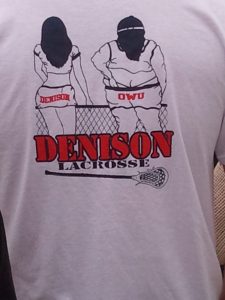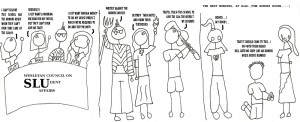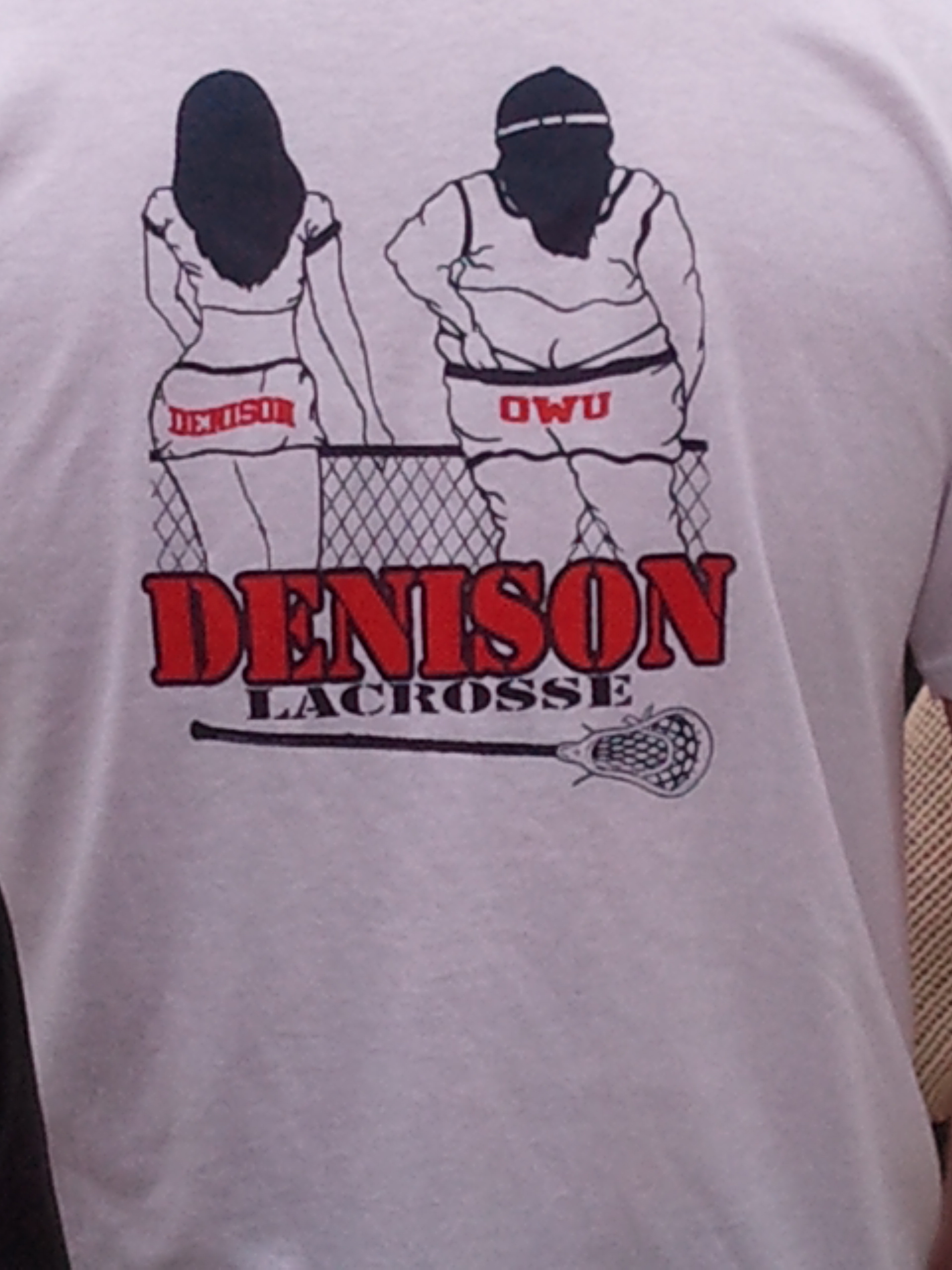Category: Opinion
Also, see Soapbox
Mommy Wars: Today’s women need to respect each other’s lifestyle choices
The comment made by Democratic Consultant Hillary Rosen about Ann Romney last week has quickly turned into a divisive political battle pitting “working” moms against mothers who stay at home to raise children.
President Barack Obama, who holds a strong lead among all female voters was quick to voice his support, for stay-at-home moms, while Rosen struggled to choke out a tepid apology for her comment.
To fill you in, Rosen said Ann Romney, wife of Republican presidential hopeful Mitt Romney, “has not worked a day in her life” and has not dealt with economic issues like the majority of American women today.
Immediately following these comments, Romney became the media’s primary target.
Rosen’s comment seems to be an attempt to marginalize Ann Romney’s decision, as a woman, to raise her own children, as well as to criticize her for her family’s wealth.
Why? What is it that Romney chose that offends Rosen so much?
Her commitment to her husband, her decision not to pursue a paying job, her wealth, her conservatism, or the lack of perceived struggle she has had?
When did the women’s movement get off track?
The movement originated to give all women the right to choose their own path, to have their own political voice, and to open women up to all career choices.
But the women’s movement has been hijacked by liberal, working women who only validate women who think as they do, have chosen a paid career as they have, and have socially and economically liberal views as they do.
I find it sad feminists don’t see the value in Romney’s role as a wife, mother and the myriad of roles that go along with both.
I believe Romney’s choice to sacrifice a paid career to raise her family, her courageous battle with two major illnesses, her continued commitment to her husband and his campaign, and her unwavering commitment to her beliefs admirable.
Rosen’s comments insinuate stay-at-home mothers are selfish, entitled, lazy and rich. This is far from the truth.
I have witnessed the challenges stay-at-home mothers face on a personal level.
My mother graduated from Boston College with a degree in communications and was working in Boston at a public relations firm when I was born more than two decades ago.
She made the decision to stay at home and raise my three other siblings and me.
My parents definitely could have used the extra income, but she was willing to sacrifice money for time with us.
My father started his own business right out of college and was working long hours to get his business off the ground.
They lived in a small two family home in Newton, Massachusetts, not their ideal living situation, but they were just starting out.
They moved from there to a fixer-upper they renovated on their own.
I think if Rosen met my mother today she would have the same criticisms of her she had of Romney.
She would assume it all came easy for my mother and her primary job to raise four children was of less value to society than what she has chosen and my parents’ success makes them out of touch.
My mother, for the most part, loved staying at home, but it did come with many sacrifices.
My mother told me the first question women would ask her, not men, was “what do you do?”
Unfortunately, many working moms and almost all feminists look down upon people like my mother who made the choice to stay home to raise kids.
Funny, I have never heard the National Organization of Women support women in this particular “right to choose.”
What many people like Rosen don’t understand is stay-at-home moms make plenty of sacrifices which go beyond forgoing a paycheck.
Women who stay home don’t get the respect they deserve and often are belittled by “working moms.”
My mother had multiple jobs when she was a stay at home mother, including my family’s teacher, coach, nurse, chef, researcher, nutritionist, therapist, college advisor, mentor, decorator, general contractor and too many others to list here.
Sometimes I wonder if women who exhibit so much contempt for moms like mine are simply displacing personal guilt for not taking their own parental responsibilities more seriously.
If Rosen is the new face of feminism, count me out. I want to be free to make any choice that is best for not just me, but my family as well.
Modern feminism does not recognize and appreciate the roles all women play.
Isn’t feminism about liberating women from the patriarchal binds that inhibit us all from living a full and liberated life?
I can’t speak to Romney’s ability to relate to the American middle class.
There’s no doubt the Romneys are extremely privileged and Romney was granted many luxuries, including the one to raise her own children.
Romney has been traveling with her husband, Mitt, on the campaign trail talking to million’s of American about their lives, concerns, families, jobless husbands and financial troubles.
If she is listening, she is in touch.
Are women only in-touch with each other if they have walked in the same shoes now?
I would like to think the future will be bright for women in America. I hope they will have the ability to choose free of other women’s criticisms.
My hope for all women is they can reach a sense of fulfillment and do whatever they find rewarding. My hope is we all celebrate (each) other’s successes.
Rosen eventually made an apology, saying, “Let’s put the faux war against stay-at-home moms to rest once and for all. As a mom, I know raising children is the hardest job there is. As a pundit, I know my words on CNN last night were poorly chosen.”
“In response to Mitt Romney on the campaign trail referring to his wife as a better person to answer questions about women than he is, I was discussing his poor record on the plight of women’s financial struggles,” Rosen said. “I apologize to Ann Romney and anyone else who was offended.”
What’s the point of social media?
Social networks have taken over the world.
It’s nearly impossible to find a person who doesn’t have a Facebook or a Twitter in 2012.
These days, social networks extend to parents, teachers and potential career organizations. I have received friend requests from teachers, parents and friends of the family.
I always feel like I have to second guess myself before I post a picture or update a status. What’s really the point of these networks if you have to filter what your saying?
Many people say they use them as a means of communication and to stay in touch with friends and family.
If they are close to you, they can send you a text, email, Skype or have an actual phone or face to face conversation. People seem to forget this.
Tweeting is a beast in itself: trying to figure out who you are going to follow, whose following you back.
It’s a crazy popularity contest.
I remember once a girl told me she was mad at me. I hadn’t seen or spoken her in nearly three years. When I asked her why she was upset, she told me it was because she had followed me on Twitter and I never followed her back.
Really? The day people start getting upset because of my Twitter activity is a sad day.
For the most part, people only follow celebrities, all in hopes they will see and contact them back.
This is just false hope. I’m pretty sure the Kardashians aren’t tweeting fans while filming one of their three reality TV seasons of the year.
I can’t judge, or look down upon anyone, though. I myself had both Twitter and Facebook. I deleted both of my sites and realized many things.
1. I never really cared what others posted. I just wanted to get my thoughts out. 2. I spent a lot of free time (boredom) looking at pictures and statuses to fill up my days. 3. I learn a lot more in class when I am not strolling the sites.
Sure, these may seem like obvious observations, but I was oblivious while I under the social network spell.
I’m not saying everyone should get rid of them, nor am I saying they are sheer evil. All I am saying is people should consider what is the point?
Sound-Off OWU: What are your summer plans?
Comic of the Week: April 13, 2012
Summer internships: an unneccessary but useful aid
This editorial is written in response to last week’s opinion piece, “Summer internships: a necessary evil”.
Simply rebuttling last issue’s article would be impossible. Contrary to what some may argue, there is no such thing as an incorrect opinion.
However, I feel obligated to expose some of the factual errors and stereotypes which slipped into the piece.
Internships are neither evil nor necessary. Certainly, the importance of experience has increased since the recession.
So far as I have seen, employers do not take a second glance at bare resumes. I have personally seen a pile of shredded resumes fill a recycling bin.
And while the article is correct that connections play a role in the application process, networking is nowhere near the most important factor in hiring decisions.
To say that this often is an overriding factor is a fallacy. When it comes to job applications, achieved merit is- thankfully- much more important than ‘knowing the right people’.
In addition to this, internships are not necessary for all students. Some employers in the sciences may accept a students with little experience, as in some fields internships are sparse and competitive.
However, some areas require prior experience of their applicants. Students seeking work in the social sciences or finance may feel the pressure of the hunt.
I can say from experience that seeking internships can be immensely stressful and frustrating. Last summer, I sent in over 20 internship applications. Every rejection message and empty-inquiry left me feeling less hopeful about a summer internship.
Luckily, I managed to snag a paid internship, somewhat of a chimera these days.
And in the 10 weeks I worked there, never once did my employers ask me to fetch coffee or spend hours by a copy machine. Instead, I prepared Keynote presentations, spearheaded my own projects, and created a resource file for future interns at my boss’ behest.
My experience may seem like an anomaly to some. It seems many people believe internships are a diluted form of slave labor, that interns must complete menial tasks without pay.
Is this why people think internships are evil? Do students base their perceptions of internships on these stereotypes?
I hope this article reaches some of the many worried, inexperienced students on this campus. I hope that they do not think internships are evil, or that they are necessary for success.
Olmstead’s trilogy completed: Historic wars through the eyes of young boy soldiers
Robert Olmstead’s war trilogy is now complete. The first book, “Coal Black Horse” was published in 2007, followed by “Far Bright Star” in 2009. The third book, “The Coldest Night,” was just released on April 3.
Reading the cycle in its entirety is a gripping and moving experience. The novels continue to haunt you long after you are done with them. The aftershocks keep coming.
What makes the cycle a trilogy? The novels follow the members of one West Virginia family as they fight in love and in war.
Robey Childs, a boy of 14, lives during the American Civil War (1861-65) and witnesses the slaughter of the Battle of Gettysburg (1863) first-hand.
Napoleon Childs, his son, is part of the Pancho Villa Expedition into Mexico under General John J. Pershing (1916-17), where he is captured and brutally tortured. And great-grandson Henry Childs fights in the Korean War (1950-53), another “forgotten war” that claimed countless American lives.
The three books have numerous overarching themes in common as well. For example, the pervasive love and reverence for horses, whose innate sense and intelligence in the book is often superior to that of humans, is evident in all three books.
Another thematic motif is the presence of the supernatural, manifested in dreams and visions.
I have no doubt that, in due time, students will be writing term papers on Olmstead’s magic realism, epistemology, cosmology, archetypes, cinematic techniques and his gripping depictions of PTSD (Post Traumatic Stress Disorder).
In addition, the novels’ internal structures are identical.
Part one of each book covers the departure and trip to the battlefield, part two takes the reader into the heart of the darkness and the belly of the beast and part three deals with the exit and the aftermath.
In the center of book two, and thus in the center of the trilogy as a whole, is death – the almost unspeakable and surely unfathomable death of Preston, a rich and spoiled, reckless and useless gambler and braggart who “wanted to experience life to the very edge.”
It is Preston’s transgressions that trigger the disastrous events in the second book, and he pays for it through horrific torment and torture and ultimately, with his life.
The three wars were meticulously researched by the author, and his depictions seem historically accurate.
However, the military conflicts form merely the backdrop.
The life-and-death battles occurring in the books transcend time and space and reach into the deepest and most elemental depths of humankind.
Love and war are timeless and universal. It is not a coincidence that Olmstead chose many of his mottos from ancient texts such as Homer and the Bible.
It is there, at the dawn of western civilization, where the roots of our existence and essence lie. Everything that follows is merely the reenactment of battles fought millennia ago.
It would be an interesting topic to explore if Olmstead’s novels are meant to celebrate or to condemn war, but it would be the wrong question to ask.
War simply is, always has been, and always will be, whether we like it or not.
Some readers may disagree with the subjective sentiment that wars are natural phenomena on par with volcanic eruptions or earthquakes and that we have little control over them.
For one thing, there are objective political and financial interests behind war, and there exist other, less destructive and more constructive outlets for the primeval bloodlust that is in all of us, even and especially in the little boys who set cats afire.
War may indeed be the father of all things, as Heraclitus says, but the Heraclitean word “polemos” can be translated in non-militant ways as well (“strife,” “confrontation,” or “competition”).
But it is certainly true that Olmstead’s characters perceive war as an overpowering mystery against which human resistance is futile.
Olmstead’s characters are defined by their war experiences, but don’t seem to care for the ideological reasons of the wars they fight in: for who or what is right or wrong.
These are considerations that barely make it to the surface in the three novels. What matters more is the existential struggle the soldiers are witnessing or experiencing first-hand and that will define them forever.
His characters are catapulted out of their ordinary existence and enter a different realm and state of being altogether where they are confronted with nothingness and meaninglessness, godlessness and inhumaneness through their experiences of war.
Their manhood is sorely tested, and lesser men perish because they cannot bear the horror.
Preston, the fool, does not last because he never learned a single lesson in life and never found the truth. But Robey, Napoleon, and Henry Childs endure and survive the ordeal, emerging as strong, mature leaders.
At his public reading on April 3 at the local Beehive Books on 25 S. Sandusky Street, Olmstead rejected the word “writer,” claiming the word “author” for himself instead. It is an interesting choice of words.
An author, as opposed to a mere writer, carries the weight of the world on his (or her) shoulders. An author has an authority and a responsibility that a writer does not know.
An author can be – must be – an authoritative and conscientious guide and cicerone, as surefooted as the Black Coal Horse, the Rattler, and Gaylen, the cinnamon bay.
It would be easy to get lost in the abyss of the underworld forever, but Olmstead not only takes his readers into the most crepuscular and evil places of humankind, a brave and courageous tour de force indeed, but he also manages to take us back to the surface and into the sunlight so that we may live on with renewed understanding and hope while recognizing our frailty and fallibility.
Olmstead’s books are insightful and gripping, forcing his reader to face many an inconvenient truth.
There is terror in these pages, but also much beauty. Sometimes, the two are inseparable.
The books are not for the faint-hearted, but reading them would be a rewarding and worthwhile experience that just might change your views and perhaps your life forever.
Isn’t this what good literature is all about?
Lacrosse rivalry turns ugly at Denison

So. Denison, apparently, sucks. At least that’s what the masses of cheering OWU fans chanted at Saturday’s Ohio Wesleyan vs. Denison lacrosse game.
I don’t know much about lacrosse, and I don’t feel any need to discuss the game at length because I wanted our team to win as much as the next fan. What I do know is that I saw some things that “sucked” on Saturday as well.
The shirts some Denison fans had made for the game? Those sucked. The side-by-side drawings of women from each school, respectively labeled on – of course, where else? – the backs of too-short skirts, weren’t just offensive to women from OWU. Attacking women’s body image and ranking one above the other is offensive to ALL women. In fact, it should be offensive to anyone, regardless of gender.
The signs OWU students held throughout the entire game, degrading Denison women and attacking their sexuality? Those sucked, too. “What’s the difference between Denison girls and blowjobs? Guys actually like blowjobs,” read one. Another exclaimed, “Denison girls: it’s like throwing a hotdog down a hallway!” What scholars we are.
Let’s take a minute to discuss women’s sexuality. Each woman from Denison, or anywhere for that matter, has a sexuality entirely her own that cannot be categorized along that of her peers with condescending one-liners on a poster. Also, each member of this diverse group of women has the right to do whatever she wants, whenever she wants, with whomever she wants, and no one, opposing sports fans or otherwise, has the right to ridicule her.
There is no right or wrong way to have a body or to practice your sexuality, but there is certainly a wrong way to show sportsmanship, and fans on both sides found it at Saturday’s lacrosse game.
Attacking women from the opposing side at a sporting event? THAT sucks.
What relevance does either the appearance or sexual practices of women who may not even be attending the game have on the performance of the (male) players?
Surely we can find better ways to support our players, or even to show our dislike of the other team.
We can even come up with sarcastic posters that are actually relevant to the game.
So why are we so inclined to degrade women?
Why did two separate groups, on either side of this lacrosse rivalry, decide that the best way to show support for their team was to insult the women at the other school? This is offensive. This will never stop being offensive. And making judgments about the appearance or sexual proclivities of women does not actually reflect their character. It reflects yours. And right now, neither Denison nor Ohio Wesleyan is looking too good.
Sound-Off OWU: Would you want to live in Stuy next year?
Can the 1-in-4 find the help they need?
One in four.
This was the tagline of a campaign by Active Minds, a national collegiate mental health advocacy group with chapters all over the U.S., including here at Ohio Wesleyan.
It represents the roughly 25 percent of adults diagnosed with mental illnesses. It is important to note, this statistic is only of diagnosed cases; it is possible that more exist, but go undetected due to barriers to treatment such as social stigma and unavailability of mental health services.
Active Minds works to combat these and other barriers, hoping to foster an environment where everyone can get access to the treatment they need without hesitation.
This has long made me wonder about the prevalence of mental health concerns at Ohio Wesleyan.
As a psychology student hoping to enter the field of counseling, I wonder “are our counseling services equipped to handle this demand?”
If we take ¼ of the student body (1850), we have an estimated 462.5 students needing mental health services. Seems like a lot, doesn’t it? Especially when compared to the capacity of counseling services, which is staffed only by 2 full-time and 2 part-time counselors.
If we assume that each of the full-time counselors work 40 hour weeks, and that the 2 part-time counselors work 20 hour weeks, that gives us 120 hour-long sessions per week available for students. (It is likely that the 2 part time counselors work more than 20 hours, but still under 40. If we assumed they worked 30 hour weeks, this only gives us 140 hour long sessions per week).
Let’s say all of the OWU students decide to seek treatment for their illnesses. If we fill the 120 available sessions per week, 342.5 (74 percent) are left without treatment.
If every student struggling with a mental illness at Ohio Wesleyan called Counseling Services today, only 1 in 4 of them could reasonably expect an appointment this week. Another one in four of them would wait a month, or maybe even longer.
If the health center posted similar wait times, parents would have the phones at OWU ringing off the hook.
While Counseling Services is able to provide a referral, the added cost and possible travel may well serve as a deterrent for some students, thus decreasing the proportion who receives the services they need.
By continuing to view mental health services as a corner to be cut, the safety, happiness and productivity of students is endangered. The loss of focus and energy accompanied by many mental illnesses can be debilitating, and once simple tasks can become monumental struggles.
Unfortunately, Ohio Wesleyan is no stranger to dangerous and sometimes tragic events that possibly could’ve been avoided with abundant counseling services.
My intent is not to belittle the counseling department, actually to the contrary. In my experience it is staffed by knowledgeable and friendly professionals who are passionate about their work.
My aim is to draw attention to their need for support as an entity of student services.
The number for counseling services is (740) 368-3145.














